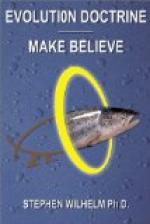To summarize, then, social evolution is a continuous process accomplished through differentiation and division of labor among the components of biological associations. Although the total form remains the same everywhere, progress has been made in content through the further subordination of selfish to altruistic conduct; only by this means does an individual gain liberty to pursue the social task for which he is best fitted by nature.
VIII
EVOLUTION AND THE HIGHER HUMAN LIFE
We have now reached the last division of the large subject that has occupied our thoughts for so long. The present title has been chosen because the questions now before us relate to the highest human ideas belonging to the departments of ethics, religion, theology, science, and philosophy. These matters may seem at first sight to be far removed from the territory of the naturalist as such, and quite exempt from the control of laws which determine the nature and history of the human individual in physical, mental, and social respects. Yet one reason alone would impel us onward: we cannot close the present examination into the basic facts of evolution and into the scope of the doctrine without asking to what extent a belief in its truth may affect our earlier formed conceptions of nature and supernature. Heretofore these possible effects upon what may be dearly cherished intellectual possessions have received no attention, so that we might learn how evolution works in the lower fields of organic life in general and human life in particular without being disturbed by them. No doubt, however, the conviction has grown with each step in our progress that the principles we have learned must cause us to readjust our views of the highest elements in human thought to a degree that must be inversely proportional to our previous acquaintance with the laws and processes of nature. But the seeker after truth is fearless of consequences. He knows that truth cannot contradict itself; and if those to whom he looks for authority give him conflicting accounts of nature’s history, he knows that one of these must be less surely grounded than the other. The investigator soon learns to withhold final judgment, realizing that the primary conditions for intellectual development are the plasticity and openness of mind that dogmatism and finality destroy. He knows that while his researches may be, and indeed must be, iconoclastic, they provide him with better icons in place of the old.
Let us recall the steps in our progress through one and another field of knowledge, from which representative facts have been chosen for classification and summary. We began with the basic principles of organic structure and workings, and then we examined serially the larger categories of the evidences relating to evolution as a fact, and to the mode of its accomplishment by natural factors. Proceeding to the special case of our




